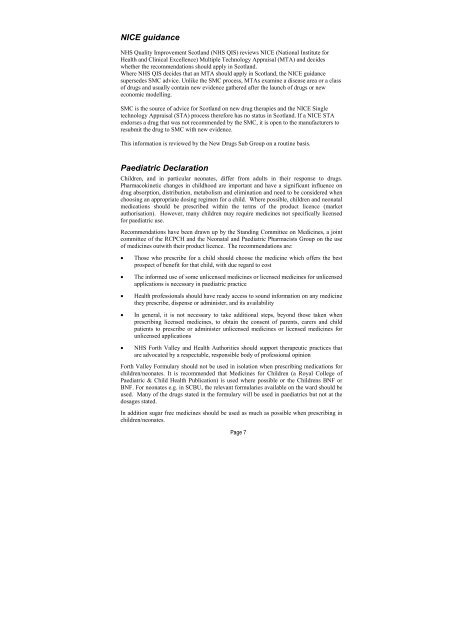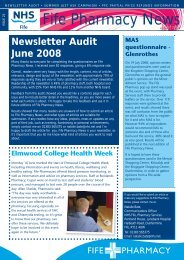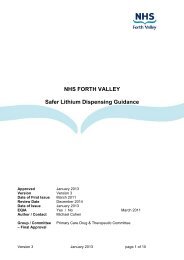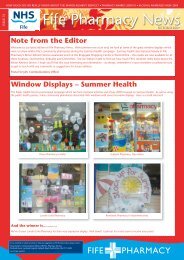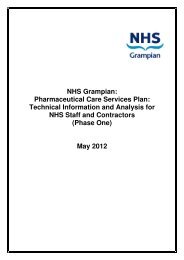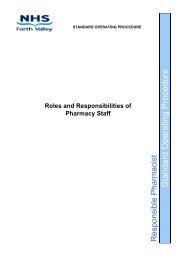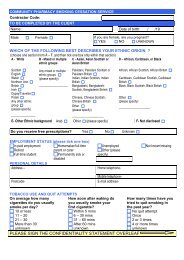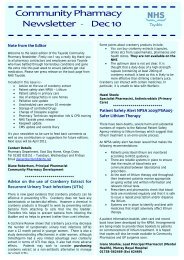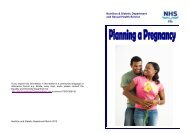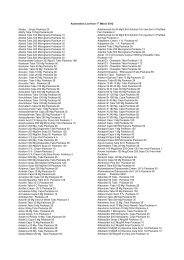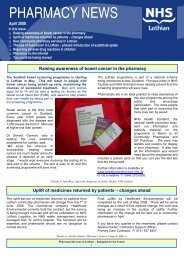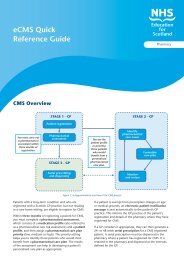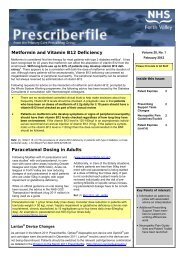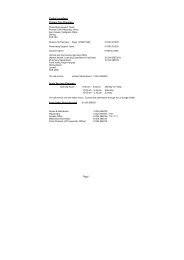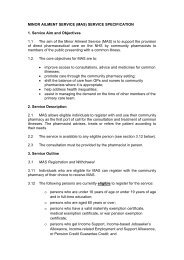nhs forth valley formulary 11 - Community Pharmacy
nhs forth valley formulary 11 - Community Pharmacy
nhs forth valley formulary 11 - Community Pharmacy
You also want an ePaper? Increase the reach of your titles
YUMPU automatically turns print PDFs into web optimized ePapers that Google loves.
NICE guidanceNHS Quality Improvement Scotland (NHS QIS) reviews NICE (National Institute forHealth and Clinical Excellence) Multiple Technology Appraisal (MTA) and decideswhether the recommendations should apply in Scotland.Where NHS QIS decides that an MTA should apply in Scotland, the NICE guidancesupersedes SMC advice. Unlike the SMC process, MTAs examine a disease area or a classof drugs and usually contain new evidence gathered after the launch of drugs or neweconomic modelling.SMC is the source of advice for Scotland on new drug therapies and the NICE Singletechnology Appraisal (STA) process therefore has no status in Scotland. If a NICE STAendorses a drug that was not recommended by the SMC, it is open to the manufacturers toresubmit the drug to SMC with new evidence.This information is reviewed by the New Drugs Sub Group on a routine basis.Paediatric DeclarationChildren, and in particular neonates, differ from adults in their response to drugs.Pharmacokinetic changes in childhood are important and have a significant influence ondrug absorption, distribution, metabolism and elimination and need to be considered whenchoosing an appropriate dosing regimen for a child. Where possible, children and neonatalmedications should be prescribed within the terms of the product licence (marketauthorisation). However, many children may require medicines not specifically licensedfor paediatric use.Recommendations have been drawn up by the Standing Committee on Medicines, a jointcommittee of the RCPCH and the Neonatal and Paediatric Pharmacists Group on the useof medicines outwith their product licence. The recommendations are:• Those who prescribe for a child should choose the medicine which offers the bestprospect of benefit for that child, with due regard to cost• The informed use of some unlicensed medicines or licensed medicines for unlicensedapplications is necessary in paediatric practice• Health professionals should have ready access to sound information on any medicinethey prescribe, dispense or administer, and its availability• In general, it is not necessary to take additional steps, beyond those taken whenprescribing licensed medicines, to obtain the consent of parents, carers and childpatients to prescribe or administer unlicensed medicines or licensed medicines forunlicensed applications• NHS Forth Valley and Health Authorities should support therapeutic practices thatare advocated by a respectable, responsible body of professional opinionForth Valley Formulary should not be used in isolation when prescribing medications forchildren/neonates. It is recommended that Medicines for Children (a Royal College ofPaediatric & Child Health Publication) is used where possible or the Childrens BNF orBNF. For neonates e.g. in SCBU, the relevant formularies available on the ward should beused. Many of the drugs stated in the <strong>formulary</strong> will be used in paediatrics but not at thedosages stated.In addition sugar free medicines should be used as much as possible when prescribing inchildren/neonates.Page 7


